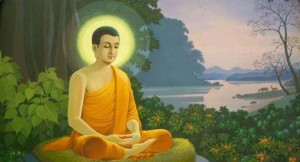 Message from Rinpoche sent to Sangha on Thursday, June 8: Saka Dawa full moon is tomorrow! This is the most holy and important day in all Buddhism. We celebrate the Buddha’s birthday, enlightenment, and death (paranirvana). The whole month of Saka Dawa is especially auspicious for creating merit. I really want my students to have a beautiful, happy celebration and create great merit in the world! Don’t miss this important occasion—it comes only once a year.
Message from Rinpoche sent to Sangha on Thursday, June 8: Saka Dawa full moon is tomorrow! This is the most holy and important day in all Buddhism. We celebrate the Buddha’s birthday, enlightenment, and death (paranirvana). The whole month of Saka Dawa is especially auspicious for creating merit. I really want my students to have a beautiful, happy celebration and create great merit in the world! Don’t miss this important occasion—it comes only once a year.
General description: Saka Dawa/Saga Dawa observations take place in the fourth Tibetan month, honoring Buddha Shakyamuni’s birth, enlightenment, and parinirvana. From May 26 to June 24, 2017, the planets and stars converge to make things especially auspicious, therefore, positive actions can be multiplied 100,000 times. This is a rare and important period, so practitioners are encouraged to practice Dharma and positive actions as much as possible during this time, and to refrain from harmful actions with extra mindfulness. Most holy of all is the full moon day of Saka Dawa, the 15th day of the Tibetan month, which will fall on Friday, June 9th.
Editor’s recap: The Manjushri Dharma Community gathered at 6:30pm, and attendees brought tsog offerings of flowers, fruits, popcorn, and sweets. Rinpoche arranged it all into a beautiful offering of food and flowers for the Guru, Three Jewels, Assembly of Heroes and Heroines. As part of the tsog ceremony, assistants made three heaping plates for the Guru, Buddha, and Dharma. The Sangha also partook in the offerings, imagining the food as holy nectar that purifies all negativities, to honor the divine within. It was a beautiful ceremony which served to accumulate merit and purify obscurations. Rinpoche took the time to explain the various parts of the ceremony to the Sangha, as this was only the second time a tsog ceremony was performed in our Forest Avenue center. After the formal tsog ceremony, participants prayed world peace. Thank you to all the Sangha members who helped with photocopies of prayers, setting up and breaking down of this Saka Dawa ceremony. Thank you to all who attended and collectively created such good energy for a peaceful world!
Rinpoche’s recap: Today, on the full moon of Saga Dawa, our offering ceremony went very well and we were able to create a tremendous amount of positive energy for the future. This root of virtue I dedicate to all living beings throughout all realms of existence . Thank you to everyone!
Pictures from June 9th, 2017 Saka Dawa Full Moon Ceremony:
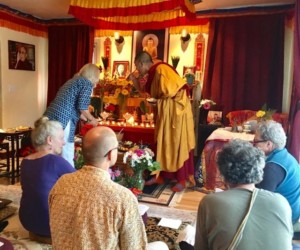
Making special plates to share
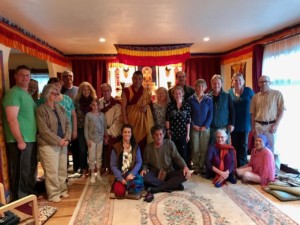
Sharing a day of special blessings, Saka Dawa Full Moon Ceremony 2017
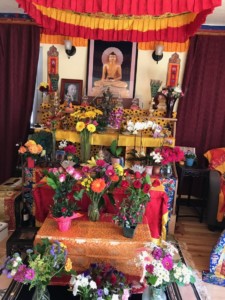
All the flowers made a special alter for Saturday meditation
More information about Saka/Saga Dawa as posted by Rinpoche on his Facebook page:
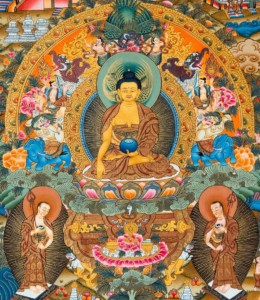
Saga Dawa is called the “month of merits” for Tibetan Buddhists. Dawameans “month” in Tibetan, and “Saga” or “Saka” is the name of a star prominent in the sky during the fourth lunar month of the Tibetan calendar, when Saga Dawa is observed. Saga Dawa usually begins in May and ends in June.
This is a month especially dedicated to “making merit.” Merit is understood in many ways in Buddhism. We can think of it as the fruits of good karma, especially when this brings us closer to enlightenment. In early Buddhist teachings the three grounds of meritorious action are generosity (dana), morality (sila), and mental culture or meditation (bhavana), although there are many ways to make merit.
Tibetan lunar months begin and end with a new moon. The full moon day that falls in the middle of the month is Saga Dawa Duchen; duchen means “great occasion.” In 2016, this day falls on Saturday, May 21st. This is the single most holy day of Tibetan Buddhism. Like the Theravadin observance of Vesak, Saga Dawa Duchen commemorates the birth, enlightenment and death (parinirvana) of the historical Buddha.
Ways to Make Merit
For Tibetan Buddhists, the month of Saga Dawa is the most auspicious time for meritorious actions. And on Saga Dawa Duchen the merits of worthy acts are multiplied 100,000 times.
Meritorious acts include pilgrimages to sacred places. There are many mountains, lakes, caves and other natural sites in Tibet that have attracted pilgrims for centuries. Pilgrims also go to venerated monasteries, temples and stupas. Pilgrims also travel to be in the presence of a holy person, such as a high lama.
Pilgrims may circumambulate a shrine or other holy place. This means walking clockwise around the holy site. As they circumambulate, pilgrims may pray and chant mantras, such as mantras to White or Green Tara, Om Mani Padme Hum or Buddha Amitabha. The circumambulation may include full-body prostrations.
Dana, or giving, may be the most common way for Buddhists of all traditions to make merit, especially giving donations to temples or to individual monks and nuns. During Saga Dawa, it’s also auspicious to give money to beggars. Traditionally, beggars line the roads on Saga Dawa Duchen knowing they are certain to receive something.
The lighting of butter lamps is a common devotional practice. Traditionally, butter lamps burned clarified yak butter, but these days they might be filled with vegetable oil. The lights are said to banish spiritual darkness as well as visual darkness. Tibetan temples burn a lot of butter lamps; donating lamp oil is another way to make merit.
Another way to make merit is by not eating meat. One can take this further by buying animals intended to be slaughtered and setting them free.
Observing Precepts
In many Buddhist traditions there are precepts observed by laypeople only on holy days. In Theravada Buddhism these are called the uposatha precepts. Lay Tibetan Buddhists sometimes follow the same eight precepts on holy days. During Saga Dawa, laypeople may keep these eight precepts on both new moon and full moon days.
These precepts are the first five basic precepts precepts for all lay Buddhists, plus three more. The first five are:
1. Not killing
2. Not stealing
3. Not misusing sex
4. Not lying
5. Not abusing intoxicants
On especially holy days, three more are added:
The sixth “holy day” precept is to eat only one meal, before noon. This is a basic precept for many monks and nuns, but most of the time it doesn’t apply to laypeople. “Grazing” is not allowed; once you’ve stopped eating for thirty minutes, the meal is done. For Tibetans, this one meal should not include meat, eggs, onions, garlic or radishes.
The seventh “holy day” precept is to avoid sleeping in a high, soft bed. The eighth is to not wear adornments — jewelry or cosmetics.
Sometimes lay Tibetans turn these special days into two-day retreats, with complete silence and fasting on the second day.
There are, of course, a variety of rituals and ceremonies performed during Saga Dawa, and these vary among the several schools of Tibetan Buddhism. In recent years, Chinese security forces have limited Ssga Dawa activities, including pilgrimages and ceremonies, in Tibet.

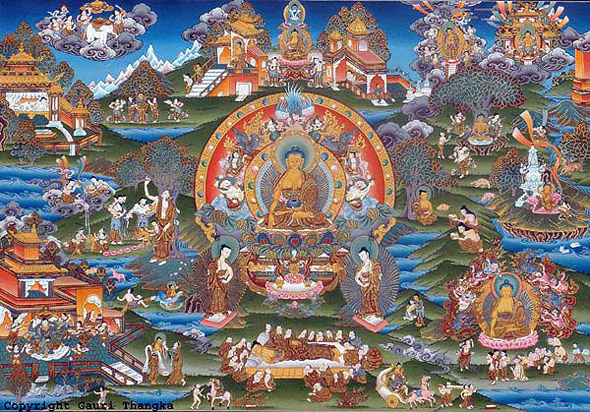
 Message from Rinpoche sent to Sangha on Thursday, June 8: Saka Dawa full moon is tomorrow! This is the most holy and important day in all Buddhism. We celebrate the Buddha’s birthday, enlightenment, and death (paranirvana). The whole month of Saka Dawa is especially auspicious for creating merit. I really want my students to have a beautiful, happy celebration and create great merit in the world! Don’t miss this important occasion—it comes only once a year.
Message from Rinpoche sent to Sangha on Thursday, June 8: Saka Dawa full moon is tomorrow! This is the most holy and important day in all Buddhism. We celebrate the Buddha’s birthday, enlightenment, and death (paranirvana). The whole month of Saka Dawa is especially auspicious for creating merit. I really want my students to have a beautiful, happy celebration and create great merit in the world! Don’t miss this important occasion—it comes only once a year.


 Saga Dawa is called the “month of merits” for Tibetan Buddhists. Dawameans “month” in Tibetan, and “Saga” or “Saka” is the name of a star prominent in the sky during the fourth lunar month of the Tibetan calendar, when Saga Dawa is observed. Saga Dawa usually begins in May and ends in June.
Saga Dawa is called the “month of merits” for Tibetan Buddhists. Dawameans “month” in Tibetan, and “Saga” or “Saka” is the name of a star prominent in the sky during the fourth lunar month of the Tibetan calendar, when Saga Dawa is observed. Saga Dawa usually begins in May and ends in June.
Leave A Comment